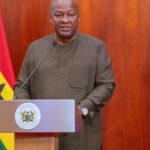In a thought-provoking interview on Face to Face on Channel One TV with Umaru Sanda Amadu, Fifi Kwetey, the General Secretary of the National Democratic Congress (NDC), passionately advocated for constitutional reforms to sever the tie between parliamentary duties and ministerial appointments.
Expressing deep concern over the burgeoning trend of individuals vying for parliamentary seats as a mere stepping stone to secure coveted ministerial positions, Kwetey emphasized that such motivations starkly contradict the fundamental purpose of legislative service.
“Parliament is a means by which you want to serve your people, and so, that should be your number one thing. So, don’t come telling me that I came to Parliament and hoping that I can get ministerial appointments. Please, please, that was not part of the contract,” Kwetey asserted, underscoring the need for a paradigm shift in the way individuals approach parliamentary roles.
In his view, ministerial appointments should be regarded merely as a “bonus,” rather than a primary driving force.
“Ministerial is a bonus. In fact, I insist that the Constitutional Review, the first thing that must be done is to decouple this business about whether you are in Parliament, you can be selected to become a government member. No, they should decouple it. So that we have genuine Parliamentarians,” he added, highlighting the imperative of purging the system of opportunistic tendencies.
Hon.Kwetey further lamented that the current system enables political aspirants to deceive voters by contesting parliamentary seats with the ulterior motive of joining the executive.
“You cannot use the MPship to deceive the people of this country. Meanwhile, what you are looking for is ministerial. Focus on legislation, your heart is to legislate, go in there, legislate. That is what I will recommend the country go. The Constitutional Review must decouple the two,” he stressed, calling for a genuine commitment to legislative duties.
Emphasizing the significance of legislative independence, Kwetey underscored that Parliament should serve as a robust check on the executive, rather than being subsumed by it.
“Parliament must become a means of checking government. So, this thing about disappointments, please tone down,” he concluded, highlighting the need for a more effective and autonomous legislative arm.









